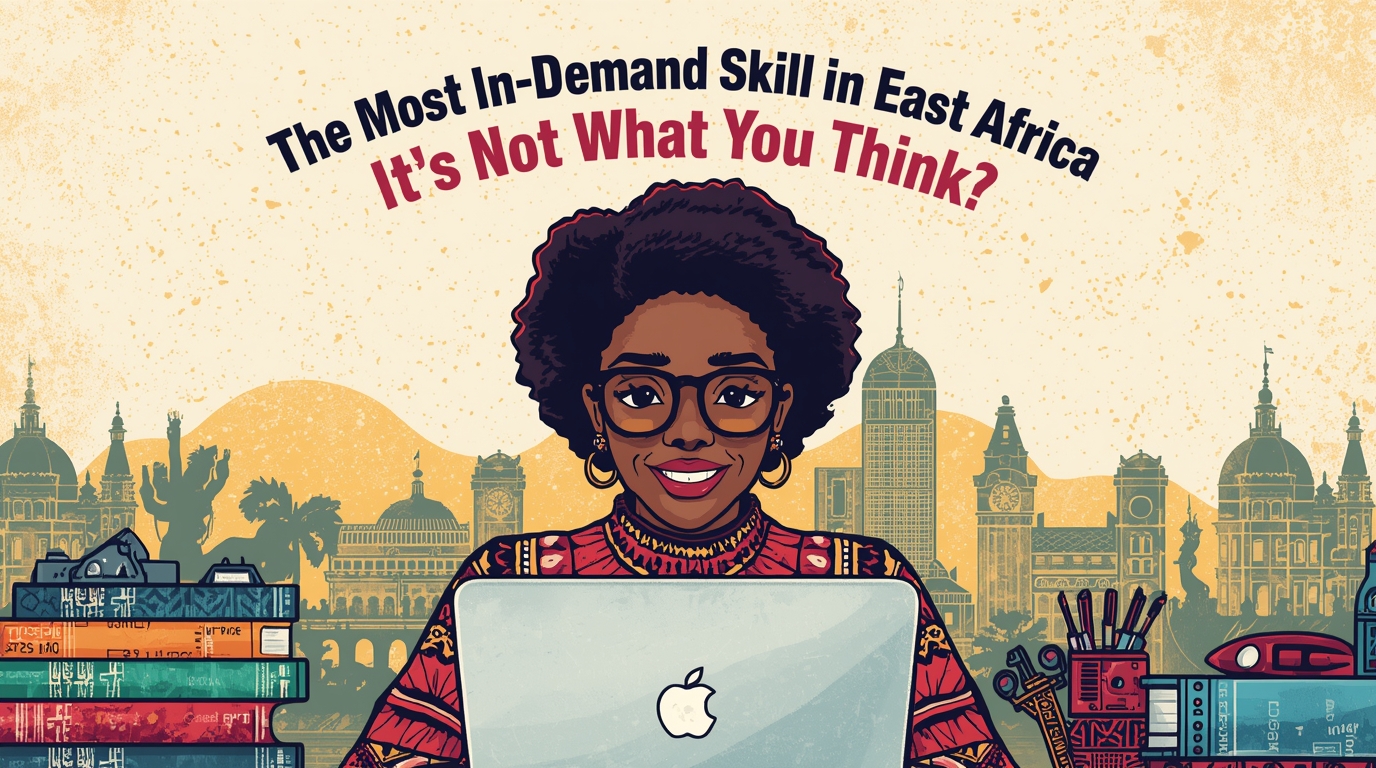I was at a pitch event in Nairobi a few years ago. It was one of those slick co-working spaces in Westlands, buzzing with energy. Two startups were pitching for the same pot of funding.
The first founder was pure passion. He was charismatic, his story was incredible, and you could just feel his hustle. He knew his idea for a new logistics app was a winner. You could feel it in your gut.
Then the second founder walked up. She was quieter. She put up one slide. Just one. It was a simple map of Nairobi showing, in stark red dots, the exact postcodes where 90% of last-mile delivery failures occurred. She had a second chart showing the thousands of shillings lost in those specific zones each day.
She didn’t just feel there was a problem; she had proven exactly where it lived and how much it cost.
Guess who got the funding?
It was the first time I truly understood that the rules of the game are changing. Here in East Africa, our hustle is our superpower. The energy in Nairobi, the vision in Kigali, the entrepreneurial spirit in Lusaka—it’s unstoppable. We are rightly proud of our ability to build, to innovate, to create something from nothing.
But the hustle, on its own, has a ceiling. And the most in-demand skill in East Africa today isn’t just the energy to build. It’s the insight to know what to build and where.
The Skill We Think is King (And Why We’re Half-Right)
If you ask anyone what the most valuable skill is right now, you’ll get a few common answers. “Coding,” someone will say. “Digital Marketing,” says another. “Entrepreneurship”—the hustle itself.
And they’re not wrong! These are all vital. They are the high-performance parts of a powerful engine. But an engine, no matter how powerful, is useless without a steering wheel and a dashboard.
This is the trap I see so many ambitious young professionals fall into. You’ve got the passion. You’ve got the drive. You’re working 12-hour days, you’ve got your side-hustle. But you’re making decisions based on your gut. You’re flying blind.
You’re in a meeting, and you know you have a good idea, but you can’t back it up. You get that horrible, sinking feeling when a senior manager asks, “What’s the data to support that?” and you’ve got nothing but a strong hunch.
That’s the hustler’s ceiling. And it’s the most frustrating place in the world to be.
The Real Powerhouse Skill (And Why It Hides in Plain Sight)
So, what is this new, in-demand skill? It’s data analytics.
Now, wait. Before you click away, hear me out.
I know what that sounds like. It sounds boring. It sounds like a back-office job for someone in glasses who loves spreadsheets and has no social skills. It sounds like something for maths geniuses, not for creative, ambitious people.
That’s the old way of thinking. That’s not what it is anymore.
I want you to stop thinking “Data Analyst” and start thinking “Data Detective.”
A Data Detective is the most powerful person in any room. They are the ones who can walk into a chaotic mess of information—all those M-Pesa transactions, all those social media comments, all those delivery logs—and find the story. They can find the “why.”
They are the ones who can answer the questions that everyone is guessing at:
- Why are our customers in Kilimani buying this, but our customers in Karen are buying that?
- Where is the next big opportunity for a FinTech app in Rwanda?
- What is the real reason our sales in Zambia dropped last month?
The most in-demand skill in East Africa is the ability to take all that digital ‘noise’ and find the simple, human story hidden inside it. It’s not about being a maths wizard. It’s about being a problem-solver, a storyteller, and an investigator.
“But I’m Not a Numbers Person!” (Let’s Tackle the Fears)
The moment you consider a skill like this, the wall of fear pops up. I get it. I’ve been there.
Fear #1: “I’m not a techy. I can’t code.” Good. This isn’t about building the database; it’s about asking it questions. Modern data analytics is more about logic and curiosity than it is about hardcore coding. It’s a creative skill. It’s about spotting patterns. If you’ve ever fallen down an Instagram rabbit hole, you have the right mindset. You just need the tools.
Fear #2: “I don’t have the time. My life is already chaos.” This, right here, is the biggest challenge for our generation. We’re already working. We’re already busy. The old model of education—quitting your job to go to a campus from 9 to 5—is broken. It doesn’t work for us. The only way to upskill is to find a new way to learn, one that fits around our chaos, not add to it.
Fear #3: “The cost… how could I possibly?” This is a big one. But let’s flip the question. What is the cost of not doing it? What is the cost of staying in your current job, at your current salary, for the next five years? The cost of seeing other people—the ones who can back up their ideas with data—get the promotions and the funding you deserve?
An M.Sc. isn’t a “cost.” It’s an investment in a much higher salary. Data scientists are among the highest-paid professionals in the region because they don’t just do the work; they show the company what work to do.
A New Toolkit for a New East Africa
So, how do you go from “curious hustler” to “data detective” without quitting your life?
This is where a new kind of education, like a modern M.Sc. in Data Analytics, comes in. Forget the old-school lecture halls. These new programmes are built for busy, working professionals. They are flexible. They are online. They are designed to give you the exact toolkit you need, fast.
A good programme will give you three core ‘superpowers’ of the Data Detective:
- The Magnifying Glass (Finding the Clues): You learn how to use the tools (like SQL) to find the right information in a mountain of data. It’s not about looking at everything; it’s about knowing where to look for the one clue that matters.
- The Interrogation Room (Making the Data Talk): This is where you use the power of modern software (like Python or R) to put the data under a spotlight and make it “confess” its secrets. This is where you find the patterns and the “aha!” moments.
- The Big Reveal (Telling the Story): This is the most important skill of all. You learn to take your complex findings and turn them into a simple, powerful story that a non-tech CEO can understand in 30 seconds. This is the skill that gets you the funding. This is the skill that gets you the promotion.
This Isn’t a “Tech Job.” It’s Every Job.
This is the final, crucial point. Data analytics isn’t just a career path for coders. It’s a skill set that makes you unstoppable in whatever field you’re in.
- In Marketing: You stop guessing what your customers want and you know.
- In Finance: You’re the one who can build the next great FinTech product for the unbanked.
- In AgriTech: You’re the one who can analyse satellite and soil data to help farmers in rural Rwanda increase their yields.
- In Logistics: You’re the one who can finally solve that “last-mile” delivery problem in Nairobi.
You stop being the person in the meeting with a “good idea.” You become the person in the meeting with the proof. You become indispensable.
Your hustle, your ambition, your East African spirit—that’s your fire. That’s what got you this far. But fire on its own is just chaos. To make it powerful, you need to focus it.
Data is the lens.
So, here’s my challenge to you. Don’t sign up for anything. Don’t make a big, scary decision today. Just be curious. Take one small step. Go and have a look at what a programme like the M.Sc. in Data Analytics actually involves. Read about the modules.
See for yourself how you can go from being the hustler with the passion to the leader with the plan.
Frequently Asked Questions
1. I’m creative and good with people, but I’m not a “numbers person.” Is data analytics really a good fit for me?
This is the biggest myth out there. The blog argues that data analytics today is less about being a maths whizz and more about being a “Data Detective.” It’s a creative skill that’s about spotting patterns, being curious, and solving puzzles. If you have a logical mind and like to ask “why,” you have the core mindset. The technical skills can be learned; the curiosity is what’s essential.
You say this is the most in-demand skill. Is it more valuable than just learning to code or digital marketing?
According to the blog, yes. Think of it this way: coding and marketing are like a high-performance engine, which is vital. But data analytics is the steering wheel and the dashboard. It’s the skill that tells you where to point the engine and how fast to go. It’s the ability to find the proof and the evidence in the data, which is what leaders and investors (like in the pitch story) actually value.
I’m already working a demanding job in Nairobi/Kigali/Lusaka. How can I possibly find the time for a Master’s degree?
The blog directly tackles this. It makes it clear that the “old model” of quitting your job to go to a physical campus is broken and doesn’t work for busy professionals. The solution is a new, flexible model—like an online M.Sc.—that is designed to fit around your work and life. You study on your own schedule, not on a rigid 9-to-5 university timetable.
Why should I pay for a full M.Sc. when I can just learn tools like Python or SQL on my own from YouTube?
You could, but that’s the long, slow, and unstructured path. The blog describes an M.Sc. as the “fast-track” because it gives you a complete, end-to-end toolkit. It doesn’t just teach you the tools (the ‘how’); it teaches you the strategy (the ‘what’ and ‘why’). Crucially, it teaches you the most important skill: “storytelling with data”—how to turn your findings into a simple, powerful story that a CEO can use to make a decision.
I don’t work in tech or finance. How will data analytics actually help me in my field, like marketing or logistics?
The blog argues that this isn’t just a tech skill; it’s a skill for every job. In marketing, you stop guessing and start knowing what your customers want. In logistics, you can analyse the data to finally solve that “last-mile” delivery problem. It’s a skill that makes you the most indispensable person in any department because you’re the one who can provide the proof for making smart decisions.




